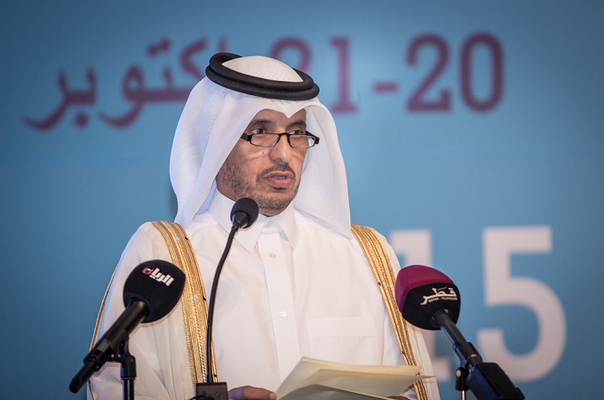
WEDF 2015 - Opening Remarks by the Prime Minister of Qatar World Export Development Forum
Good morning.
On behalf of the State of Qatar I would like to extend a warm welcome to the Executive Director of the International Trade Centre, Ms. Arancha González, as well as the rest of the distinguished delegates and panelists assembled here today. For us, it is an honor and a privilege to have the opportunity to hold the 2015 World Export Development Forum here in Doha. We hope that this occasion will provide everyone with the chance to exchange frank and open views on current economic development and trade-related issues. We are also very happy that you have decided to come to Doha, a place whose economic development, you will have witnessed, is intricately linked to international trade.
Let me begin by saying that we understand, and value, the role that export activities can play in economic development and the ultimate well-being that it can bring about for our people. Being an economy that imports most of what it consumes and exports most of what it produces, Qatar relies on its international trade commitments and partners to stride towards its strategic development goals. To this end, we have structured both our trade policy and institutions to facilitate trade in both goods and services. In particular, three years ago we set up Tasdeer, an export promoting agency that is part of Qatar Development Bank, with the objective of supporting our non-hydrocarbon export-oriented firms, most of them private sector SMEs. The program has so far outperformed our expectations and is currently ranked amongst the top 10 trade promotion organizations by the ITC. We are pleased to know that this program’s export promotion initiatives have allowed some of our domestic companies to insert themselves in international supply networks.
This leads me to one of the central themes of this conference. The sustainability of international trade flows—we have realized—always requires significant investment efforts as well as innovative policies and appropriate institutional arrangements. This is particularly important for a country like Qatar. For example, the recent volatility in world energy prices, which directly affects our export-revenues, has forced us to evaluate different alternatives to balance, on the one hand, the need to maintain competitive exports, including downstream manufactured products, with, on the other hand, our economic development commitments here at home. We fully realize that the future welfare of our people depends on Qatar’s access to competitive markets, both for exports and imports, and it is in this sense that we embrace world markets and welcome discussions on innovation and investment as guiding principles of our public policy.
Furthermore, the world’s changing landscape will continue to create challenges for sustainable trade. Whether we want it or not, continuing to fulfil our countries’ economic development potential will demand from all of us the courage and vision to adapt our existing policy frameworks to better deal with economic and social change everywhere. Emerging risks will also force us to rethink how we can adapt and adjust our trade activities. In particular, economic diversification, a key issue for us here in Qatar, will require particular attention so that our economy can develop as broad an export base as possible whilst it continues to exploit its natural comparative advantages.
To this end, we strive to position Qatari companies in the global economy’s production chains by promoting, amongst others, the export of intermediate goods and services. This, we believe, will further aid our economic diversification efforts by creating sustainable demand for our products and, in consequence, stabilize our overall exports. The more diversified our economies are, the more diversified world demand will be and, consequently, the more sustainable our trade flows and export-led development strategies will become.
Food and water security, a mounting economic development concern across all countries, is another delicate area relevant to sustainable trade. In this sense, now, more than in recent times, we need to grasp the fundamentals that link international trade, particularly export activities, with economic development. The current speed of social and economic change around the world demands it from us. Qatar itself is a prime example of this.
In closing, I would like to wish everyone the benefits of fruitful and candid discussions amongst colleagues and friends. Finally, I would ask that you allow us the honour of showing you our traditional Qatari hospitality. I am sure that we will not disappoint you.
May the conclusions of what we are about to begin here today serve as reference for the wellbeing of our peoples in the future.



